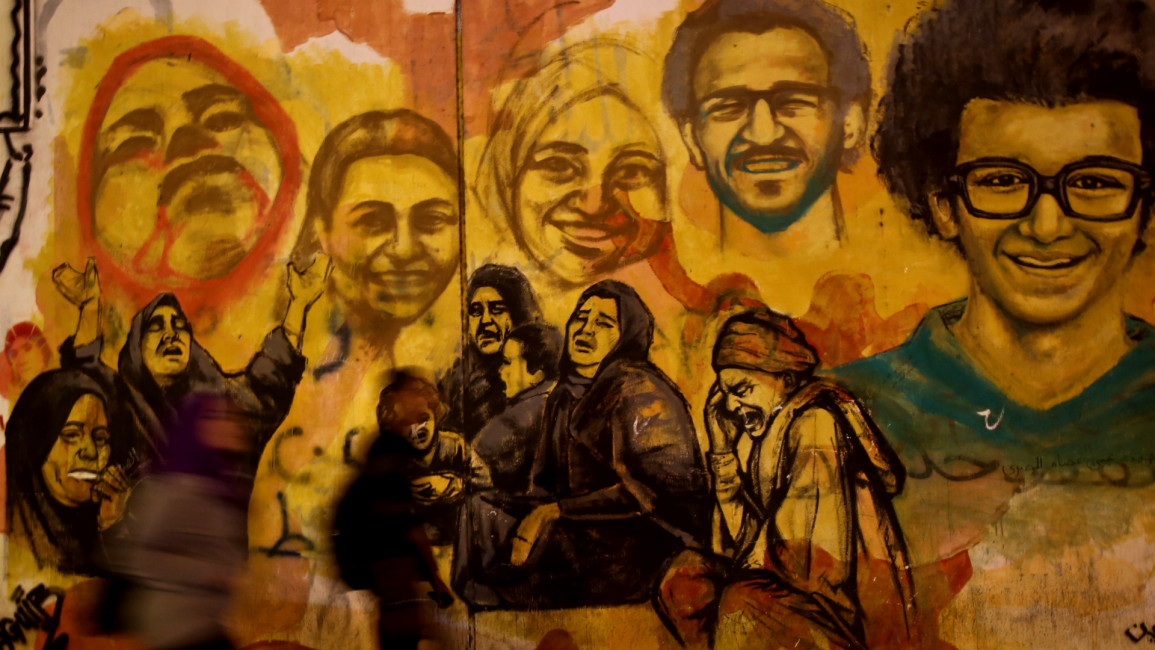Egypt: Understanding Mohamed Mahmoud
Egypt: Understanding Mohamed Mahmoud
Egypt needs to understand the reasons behind clashes in the country over the last three years, so it can move forward and embrace stability.
4 min read
Graffiti marks the third anniversary of the Mohamed Mahmoud clashes [AFP]
On the third anniversary of the deadly clashes in Mohamed Mahmoud Street in Cairo between protestors and security forces, the event is only significant to those who were directly affected by it. This is unfortunate. Every Egyptian needs to remember these clashes and understand what caused the climate that led to them.
Stability and development can only be achieved if you understand why there is instability in the first place. This is especially important now Abdel Fattah al-Sisi's regime is continuing to create new enemies amongst the youth, who have no choice except to resist if they want to control their own destinies.
Stability and development can only be achieved if you understand why there is instability in the first place. This is especially important now Abdel Fattah al-Sisi's regime is continuing to create new enemies amongst the youth, who have no choice except to resist if they want to control their own destinies.
| The Sisi regime is trying to rewrite events since 25 January 2011 to its own advantage. |
Egypt's media, for all its variety, are unified in ignoring calls for the Mohamed Mahmoud case to be reopened. It seems the mantra, "the Brotherhood sold us out in Mohamed Mahmoud" has been internalised.
Even those faint voices warning against the dangers of closing past wounds without cleaning them first are not being heard.
In a famous leak, Sisi once asked a group of army officers: "Who killed the people in Mohamed Mahmoud?" His media are not asking the same question, not even to find out if Sisi ever found an answer. Everyone is expected to believe that the head of the most powerful institution in Egypt is not aware of what happened, and did not see the videos of police officers shooting protesters in their eyes and chests.
We are to believe that Sisi was not watching when confrontations erupted after the police dragged protesters from Tahrir Square, or how this stupidity and mismanagement enflamed anger for months afterwards.
Reasonable people warned that if the protests were mishandled it would lead to inevitable confrontations and everyone would lose. The Military Council and its Muslim Brotherhood and Salafi allies responded to these warnings with arrogance and accusations of disloyalty.
Several younger revolutionaries have remained devoted and continue to mark the Mohamed Mahmoud anniversary, even those some of their comrades have changed their position.
Some Muslim Brotherhood supporters, meanwhile, remain deluded and believe their party is, by God's grace, more popular than Sangam (the first Bollywood movie to be screened in Egypt, in 1964). But then, as they were unable to reinstate "legitimacy", they do not mind if the country collapses on everyone's heads.
A small number of Brotherhood supporters think their know-it-all tactics will solve the historical crisis the party is facing. They wrongly believe that sudden calls for unity will convince people to overlook their crimes, which preceded the crimes committed against them. The argument that "the coup is trembling" is no longer convincing to their own allies, and Brotherhood supporters think they can replace it with calls of unity for a new revolution.
As they try to form a new united alliance, Brotherhood supporters are using the following logic: "We sold you out in Mohamed Mahmoud and you sold us out in Rabaa (the August 2013 massacre), so we're even." But this is false logic, because the Brotherhood has not publicly changed its position on Mohamed Mahmoud nor on the Mespero and Cabinet Office massacres.
By contrast, many Brotherhood opponents did stop supporting the Sisi regime after the Rabaa massacre, and they endured all manner of repression and vilification for their principled position against collective punishment.
Although this depressing picture is likely to continue, it will not last forever. Bitter experience and sad reality will make most Egyptians realise that Egypt's only salvation is through building a democratic civic state based on the principles of freedom and social justice.
Such a state would draw the appropriate lessons from the events at Mohamed Mahmoud, and oppose military rule and repressive institutions with the same fervour as it would religious rule.
Egypt has suffered both types of rule, either in cahoots or at each others' throats. This is why the country has not faced so many problems since 1952, and why neither form of rule can form part of the answer.
This is the only way forward if we want to find a comprehensive solution, one that deals with the roots of Egypt's malaise, rather than creates more problems.
This article is an edited translation from our Arabic edition.
Opinions expressed in this article remain those of original author, and do not necessarily reflect the opinions of al-Araby al-Jadeed, its editorial board or staff.



